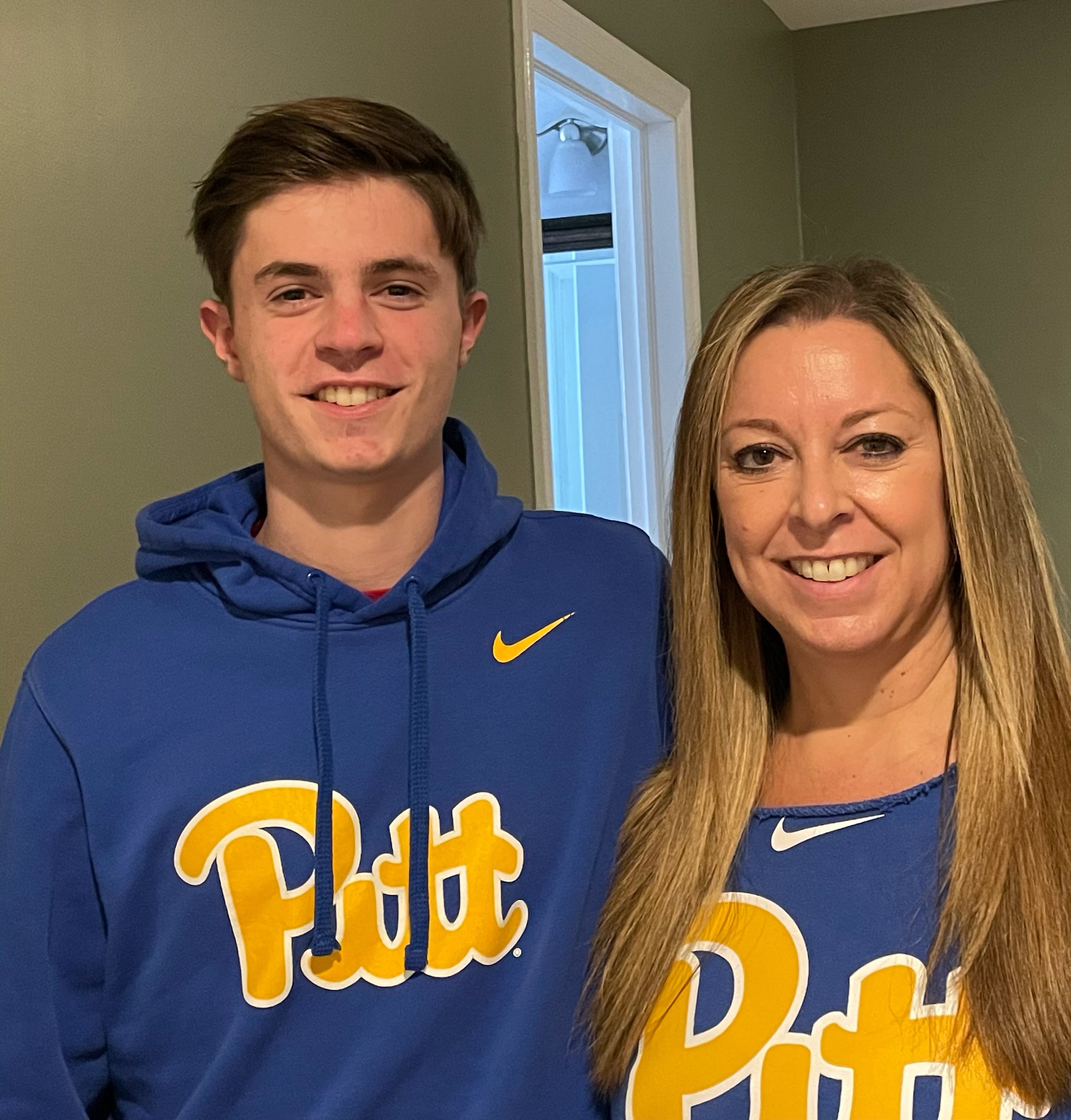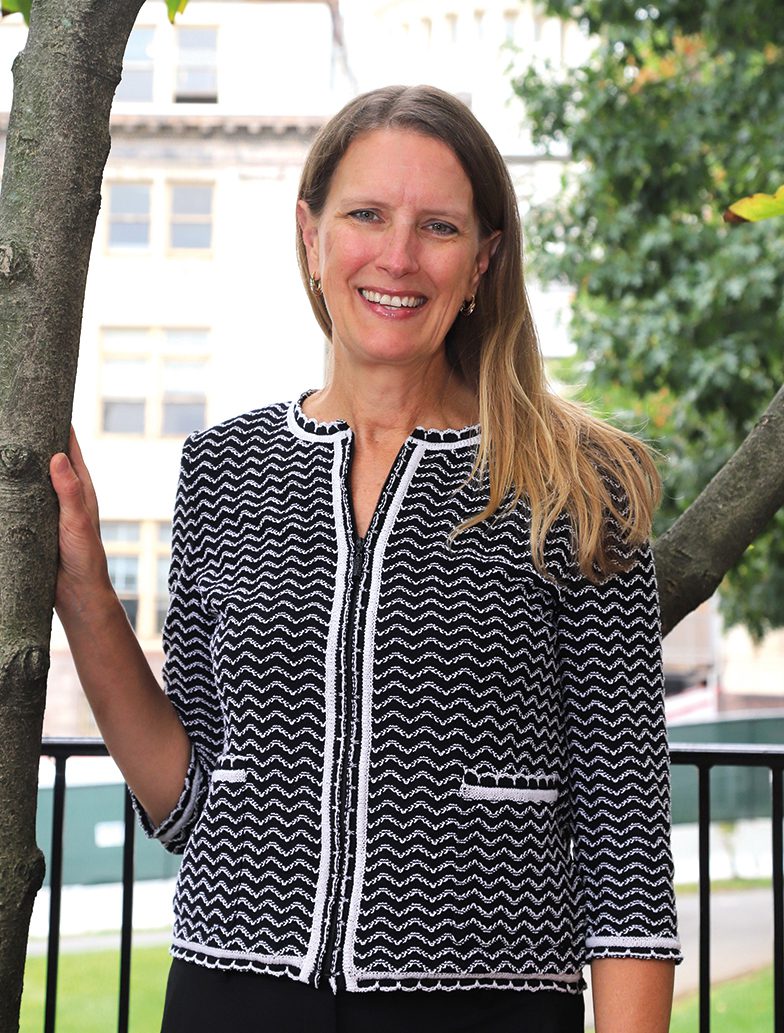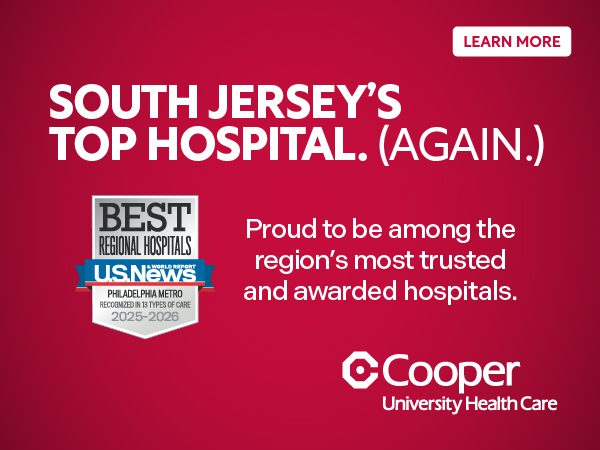Like his older sister before him, Cherry Hill East senior Brett Vogel figured he would be taking a few road trips this school year to college towns, following a few peppy tour guides on-campus tours and maybe even sitting in on a class or 2.

Brett Vogel and his mom Michelle
But like so much else in the past year, that kind of planning went out the window when the pandemic hit. Colleges sent their students home last spring only to reconvene classes on Zoom. Admissions offices had to shut down tours and open houses at the height of the year’s recruiting season. The college search playbook was rewritten overnight, leaving students – and their parents – unsure how to prepare for making one of the most significant and costly decisions of their lives.
“There was nothing normal about looking for colleges this year,” says Michelle Vogel, Brett’s mom. “Although he doesn’t seem upset by it, I feel sad he missed out on part of the college experience.”
Vogel was lucky – her daughter is a junior at the University of Pittsburgh, so she’s been through this process before, and Brett had a vague idea of what college life was like from his sister. But that didn’t make the process any less nerve-wracking, she says.
“Since we couldn’t talk to students on campuses, we asked friends, neighbors and older classmates about their school experiences,” says Vogel. “We also relied heavily on Brett’s guidance counselor to help us understand what academic components we should be looking for.”
They combed campus websites – not only to look through course selections, but also to get a feel for the learning communities, clubs, sports and campus-life information they would have gotten on a tour. For schools within driving distance, they hopped in the car for “unofficial visits” – self-guided walks through the campus. Other times, they clicked through the campus quad online.
“College websites with 3D tours are great because you could get a sense of the campus layout without having to leave home,” says Vogel.
Even if you were college shopping before Covid, you could have found a lot of that information online. But now that websites have become a significant recruitment tool, schools have been revamping their virtual spaces, making them a lot more user-friendly and engaging, says Anthony Lowman, provost and senior vice president for academic affairs at Rowan University.
“The pandemic has forced us to become more creative and innovative in how we convey campus life online,” says Lowman, noting that the biggest selling point in normal times was giving prospective students a glimpse of campus life in action.
“The more people you get on your campus, the more likely you are to get them to enroll,” he says. “But now we’ve had to pivot to create a comparable experience in a virtual space.”
As a result, Rowan now offers live open houses online as well as information sessions with videos showing what classes are like. The recorded events show everything from a science lab to concerts featuring the School of Performing Arts’ opera company or percussion ensemble. Rowan is also offering online access to admissions counselors and campus ambassadors, who will answer questions almost as soon as you push down the return key.

Anthony Lowman
Now that roughly 2/3 of Rowan’s students are back on campus with added Covid safety precautions and easy access to testing, prospective students can also visit in person for private tours. While it’s still not possible to gather in a lecture hall for group presentations from an admissions officer or for students to walk through residence halls, it does offer the opportunity for a more personalized tour, says Lowman.
Physical access to colleges might not be the same, but the pandemic has offered a unique perspective of the values of many universities, says Lowman. Each school’s response to the pandemic – its safety protocols, how student quarantines were handled and even how cafeterias changed their buffets – shows what value a school really places on the wellbeing of students.
“When the pandemic broke out, a lot of colleges showed their true colors,” says Lowman. “You can look back now and see how quickly and comprehensively they stepped up to prioritize the health and safety of their students. Now is the time to be innovative, so even if they stumbled at first, see how much they pivoted to ensure their students still had a high-quality education.”
The shift to online learning will likely stick around, with students now actively seeking out programs that offer a mix of in-person and virtual classes. How colleges are revamping courses to work to the strengths of both online and in-person learning should be factored into the college search, he says.

Merodie Hancock
For colleges that specialized in online coursework long before the pandemic – including Thomas Edison State University (TESU) – the Covid restrictions haven’t brought about drastic changes, says Merodie Hancock, TESU president. However, interest in their programs has skyrocketed as more people have become comfortable with and understand the benefits of remote learning. This is especially true of those who lost jobs during the pandemic or otherwise are in need of retraining.
“A lot of people are seeing that their industry is changing in this new normal, and they need another degree or certificate to stay on top of their careers,” says Hancock. “Now that so many schools have gone virtual, people who otherwise may not have considered an online degree are starting to see it in a different light.”
That works for TESU, which has 4 decades of experience in offering flexible programming geared toward adults pursuing a bachelor’s or graduate’s degree to further their career.
“The world of online teaching is a science – it’s not as easy as having everyone log into Zoom as if you were in a lecture hall,” says Hancock. “It takes knowledge, continual assessment and continuous improvement not just by the institution, but by the student as well, and that’s something to consider when choosing a program.”
Some students who stumbled in the traditional classroom thrive in the remote realm, while it may not be the best way for others to pursue higher education, she says.
“Online learning gives students a lot of flexibility to decide for themselves how and when they complete their coursework, which allows them to keep their full-time jobs, take care of their families or learn in a way that best suits them,” says Hancock. “But it presumes a certain amount of maturity and organization. There’s no credit for just showing up for class Tuesdays and Thursdays. You have to be active.”
Adults who have been out of high school for a while and have already logged some time in the workforce have different needs than traditional students. They may not have the luxury to learn for the sake of learning – they want to be able to apply every aspect of their education directly to their day-to-day work, says Hancock.
For them, TESU offers more flexible programming, such as the chance to factor in their work experience towards earning a degree or the opportunity to test out of classes in their area of expertise. Some courses connect students to mentors who are leaders in their field and provide invaluable hands-on guidance, she says.
For anyone on a college search – both traditional students and older adults – the best approach is to take time to figure out what you want to get out of higher education, says Lowman.
“You may not be able to experience online the same gut feeling you might get walking through a college campus,” he says. “But between websites, peers, school resources and admissions counselors, there’s more than enough information available to give you confidence in whatever decision you choose.”
For the Vogels, the journey included 7 in-person campus visits and countless more virtual tours. In the end, Brett is following in his sister’s footsteps – all the way to the University of Pittsburgh.
“It wasn’t the typical experience, but Brett’s okay with that,” says Vogel. “Whatever happens, we know we did everything we could to make sure he’ll be in the right place next fall.”














